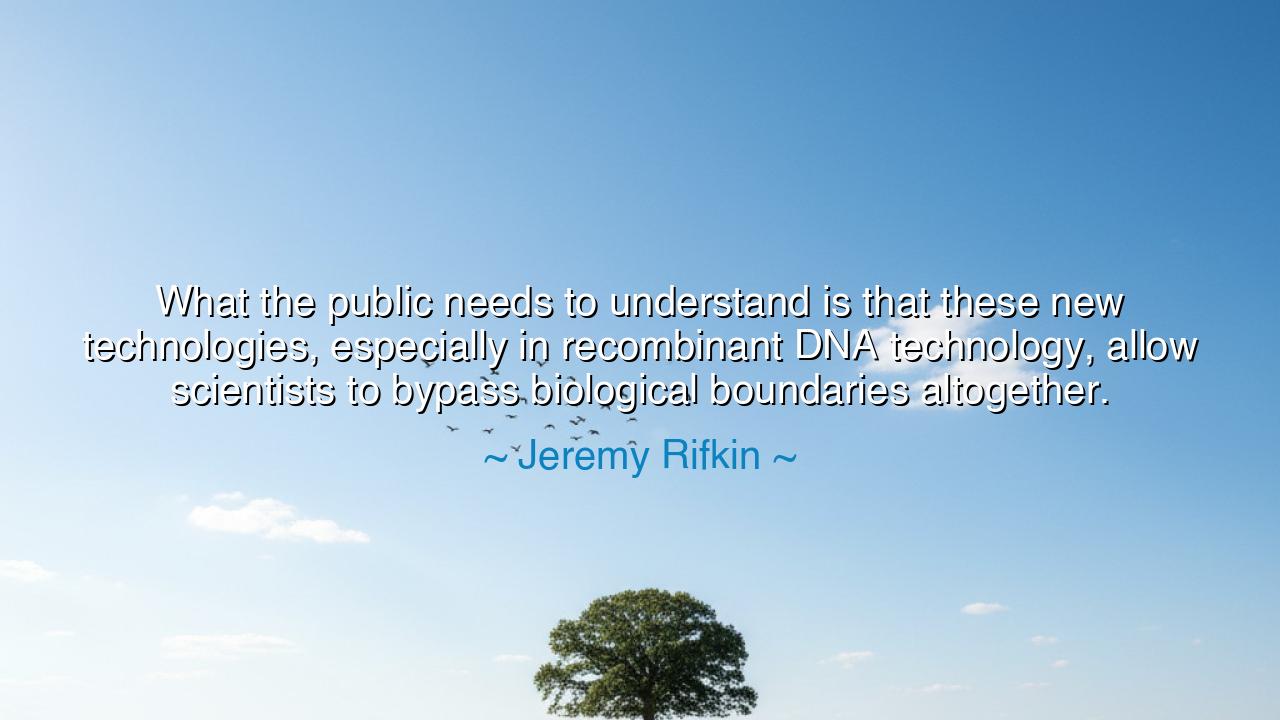
What the public needs to understand is that these new
What the public needs to understand is that these new technologies, especially in recombinant DNA technology, allow scientists to bypass biological boundaries altogether.






The words of Jeremy Rifkin, “What the public needs to understand is that these new technologies, especially in recombinant DNA technology, allow scientists to bypass biological boundaries altogether,” resound as both a revelation and a caution. He speaks of a new era in which science possesses the power to transcend the natural limits that have governed life for millennia. Recombinant DNA, a tool of immense promise, allows humanity to manipulate the very building blocks of existence, creating possibilities both miraculous and fraught with uncertainty. Rifkin’s words demand that the public recognize not only the power of innovation, but the moral and ethical responsibilities that accompany it.
The origin of this insight lies in Rifkin’s career as a social theorist and activist during the rise of genetic engineering in the late twentieth century. Observing the emergence of recombinant DNA techniques, he foresaw a transformation in the way humans could intervene in life itself. His warning was that the public, often unaware of the depth of these changes, must be informed and engaged, for technology that bypasses biological boundaries carries consequences that ripple across generations, ecosystems, and society as a whole.
History offers a parallel in the dawn of the nuclear age. The discovery of atomic energy enabled humans to wield forces once thought untouchable, reshaping warfare, energy production, and the global balance of power. Yet the public’s understanding lagged behind the science, and the consequences of mismanagement or secrecy were profound. Rifkin’s words echo this lesson: with great technological power comes the imperative for public comprehension, discourse, and vigilance.
Even within biology itself, the story of genetically modified crops illustrates the double-edged nature of crossing natural boundaries. Scientists developed plants resistant to pests and disease, promising higher yields and greater food security. Yet these innovations also raised questions about ecological balance, cross-species gene transfer, and long-term impacts on biodiversity. Recombinant DNA technology, like all boundary-bending tools, magnifies both potential and risk, demonstrating the necessity of informed understanding and prudent stewardship.
The meaning of Rifkin’s statement is profound: technology does not merely extend capability; it transforms the rules of nature itself. To manipulate genes is to intervene at the most fundamental level of life, and society must be aware of both the promise and peril. Ignorance is no longer a shield; it is a liability. The public, scientists, and policymakers alike must engage in dialogue, ethical evaluation, and responsible governance to ensure that power is exercised wisely.
The lesson for humanity is urgent: innovation without comprehension can be as dangerous as it is miraculous. Every leap across biological boundaries requires foresight, humility, and ethical reflection. Recombinant DNA technology exemplifies this duality: it can cure diseases, enhance understanding, and feed the world, or it can unleash unintended consequences that reverberate for generations. Knowledge and responsibility must accompany power.
Practical action follows naturally. Educate yourself and others about the capabilities and implications of genetic technologies. Encourage transparency in scientific research and public debate over ethical dilemmas. Advocate for policies that balance innovation with safety and moral consideration. Foster dialogue between scientists, policymakers, and communities so that advances in recombinant DNA technology serve humanity without endangering the delicate web of life.
Thus, let Jeremy Rifkin’s words echo as a warning and a guide: these new technologies allow scientists to bypass biological boundaries, and with that power comes profound responsibility. May every generation heed this call, approaching the manipulation of life with wisdom, humility, and foresight, ensuring that the miracles of science do not become instruments of harm, but tools for the flourishing of all life on Earth.






AAdministratorAdministrator
Welcome, honored guests. Please leave a comment, we will respond soon